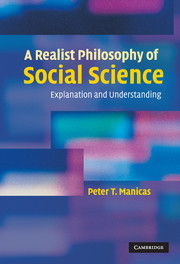Book contents
- Frontmatter
- Contents
- Acknowledgements
- Introduction
- 1 Explanation and understanding
- 2 Theory, experiment and the metaphysics of Laplace
- 3 Explanation and understanding in the social sciences
- 4 Agents and generative social mechanisms
- 5 Social science and history
- 6 Markets as social mechanisms
- Appendix A The limits of multiple regression
- Appendix B Comparison, Mill's methods and narrative
- Appendix C Rational choice theory and historical sociology
- Appendix D The neo-classical model
- References
- Index
1 - Explanation and understanding
Published online by Cambridge University Press: 12 November 2009
- Frontmatter
- Contents
- Acknowledgements
- Introduction
- 1 Explanation and understanding
- 2 Theory, experiment and the metaphysics of Laplace
- 3 Explanation and understanding in the social sciences
- 4 Agents and generative social mechanisms
- 5 Social science and history
- 6 Markets as social mechanisms
- Appendix A The limits of multiple regression
- Appendix B Comparison, Mill's methods and narrative
- Appendix C Rational choice theory and historical sociology
- Appendix D The neo-classical model
- References
- Index
Summary
Introduction
Despite some contentiousness between both working social scientists and many philosophers, ideas about explanation in social science are remarkably taken for granted. Worse, when examined in the clear light of day, there is good reason to say that these taken-for-granted ideas are downright wrong. Most social scientists have been socialized to carry on inquiry as defined by their disciplines, they have well-defined research projects and, perhaps quite reasonably, they are content to leave the philosophical problems to the philosophers. No one presses them to wonder whether, indeed, key assumptions unreflexively absorbed are problematic. Some very good work is done that cannot be squared with their implicit or, sometimes, explicit background assumptions. Not only is it not always easy to tell others exactly what we are doing, but we can be mistaken about what we are doing. In his 1933 Herbert Spencer lecture at Oxford, Einstein, often ahead of most people, offered pertinent advice: “If you want to find out anything from the theoretical physicists about the methods they use, I advise you to stick to one principle: Don't listen to their words, fix your attention on their deeds.”
A good deal of the responsibility for the taken-for-granted ideas about explanation among social scientists owes directly to philosophers in the latter half of the twentieth century, although the antecedents are found as early as Comte in the early nineteenth century.
Information
- Type
- Chapter
- Information
- A Realist Philosophy of Social ScienceExplanation and Understanding, pp. 7 - 25Publisher: Cambridge University PressPrint publication year: 2006
